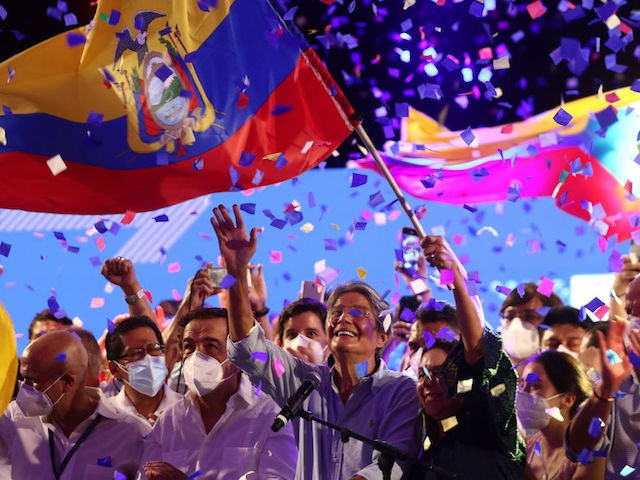Conservative former banker Guillermo Lasso won Sunday’s presidential election in Ecuador, defeating socialist opponent Andrés Arauz.
Sunday’s was Lasso’s second consecutive bid to run the country, having lost to outgoing president Lenin Moreno in 2017. Moreno, like Arauz, ran for president as a socialist candidate endorsed by Rafael Correa, who ran the country from 2007 to 2017. Correa’s tenure was defined by Ecuador’s support for dictators in Cuba and Venezuela, questionable business dealings with communist China, violent threats against journalists and conservative opponents, and criminal behavior for which he was convicted during Moreno’s term. Almost immediately after winning the presidency in 2017, Moreno turned on Correa — and his allies in Cuba, Venezuela, and China — greenlit criminal investigations against him, and enacted conservative reforms to the government. Moreno also amended the nation’s constitution to make it illegal for Correa to ever run for president again.
Correa endorsed Arauz from exile in Belgium, where he moved following his presidential term to avoid his eight-year prison sentence on charges of corruption. While facing accusations of ties to Latin American Marxist terrorist organizations and questions regarding his relationship with Correa, many analysts expected Arauz to succeed in both February’s general presidential election and the run-off on Sunday. In many Latin American countries, if no candidate receives over 50 percent of the vote in an initial election, the top two candidates go on to a run-off vote on their own.
Instead, Lasso inched into second place in February’s election, defeating far-left but anti-Correa indigenous leader Yaku Pérez, and defeated Arauz by about four percent of votes Sunday. With 96.68 percent of votes counted, Ecuador’s El Universo gave Lasso 52.46 percent of the vote to Arauz’s 47.54 percent. Lasso supporters celebrated Sunday night with the increasingly popular slogan “Correa Never Again,” a sign that voters rejected the return of socialists to power as much, or perhaps more, than they trusted in Lasso. Adding to impressions that Lasso was less popular than Correa was unpopular in this election is the fact that Correa’s PAIS Alliance party continues to dominate the National Assembly, the federal legislature, while Lasso’s Creating Opportunities (CREO) party counts on only 12 of 137 lawmakers.
“I wouldn’t say that they are all with Lasso, but they certainly all successfully united in a discourse whose principal argument was, ‘let’s negotiate,’ ‘let’s find middle ground between our differences’ versus the authoritarian discourse of a sole option imposed on everyone,” El Universo columnist Gabriela Calderón said of the coalition that brought Lasso to power.
In his victory speech, Lasso acknowledged that a desire for change away from socialism had helped him become president.
“Today is a day of celebration, democracy has triumphed,” Lasso told supporters. “Ecuadorians have used their right to choose and opted for a new path, very different from that of the last 14 years in Ecuador.”
He also appeared to take barbs against Correa, whose legacy of political persecution had sourced the Ecuadorian public on socialism.
“I am not arriving with a list of people to persecute or put in jail; I want to see all Ecuadorians free, not afraid of their government, without fear of dissenting with the president of the Republic, to express their opinions with freedom,” Lasso said. “We will work with decisiveness so that all 17 million Ecuadorians will benefit from the change of a democratic, free, prosperous country, a country of liberty, a country where no one has to be afraid. Tonight we can all sleep in peace and calm.”
Arauz appeared to surprise many by accepting defeat and calling Lasso to concede, an increasingly uncommon sight in greater American politics. Lasso himself did not accept his defeat at Moreno’s hand, claiming the socialists had committed fraud and publishing alleged evidence of manipulated ballots.
Arauz addressed the country in a concession speech that urged supporters to unite with Lasso voters “to return to being just one Ecuador, one sole Ecuador.”
“During campaigns, we argue and propose with conviction and seek to differentiate ourselves. Of course, we believe that we represent and struggle for different ideas and values,” Arauz said. “But today the moment has come to advance. We have to build bridges and construct consensus.”
Arauz told supporters that his loss was not “a political or moral defeat.” Perhaps addressing Correa’s growing unpopularity, he added, “we are a responsible and democratic actor in Ecuador.” Arauz is a member of the Citizen Revolution Movement party, affiliated with the PAIS Alliance, and a veteran of Correa’s cabinet.
Lasso’s first major challenge as president will be to repair the economic and human destruction caused by the Chinese coronavirus pandemic. Ecuador, a small country of 17 million residents, has documented 346,817 cases of Chinese coronavirus and over 17,000 deaths. Strict lockdowns imposed under Moreno caused significant financial harm and resulted in gruesome scenes of mass death in some cases. In one instance, in the city of Guayaquil, police found nearly 800 people dead in their homes after morgues filled up and authorities asked residents to stay indoors and keep the bodies of their dead loved ones until space opened up. Outside of homes, bodies piled up on the streets of Guayaquil, in front of medical offices where families hoped health workers would be able to preserve their loved ones.

COMMENTS
Please let us know if you're having issues with commenting.